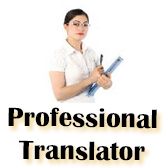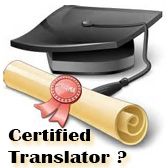Are You A Professional Translator?
A
professional translator is a person who has the knowledge and expertise to do the job with ease. Moreover, a
professional translator would undergo lots of training, volunteering, and work related experience that make him suitable to be a professional translator.
Being bi-lingual is an outstanding expertise, but fluency in a different language implies that being able to understand, converse, read, and write in that language at the levels of an knowledgeable local speaker. Being proficient is only the initial step in starting to be a professional translator.
Like any other occupation, it demands practice, expertise, and training. There can be no one direction to achievements, but here are some excellent recommendations:
How To Become A Professional Translator?
Get Certified
Individuals who want to become a
professional translator should get some kind of certification or documentation. Having qualifications offers records that you have the abilities needed to translate skillfully. Many educational institutions provide superior degrees and qualified certifications in translation.
Get Examined
A strong cv creator is to take language expertise as second language skills tests to show prospective customers that you are certainly fluent in your particular language.
Obtain Expertise
The next phase is to obtain expertise. All of us had to start out doing coop or working low-level jobs in order to go up the ladder, and the language industry is no different. If you’re registered at or stay near a higher education institution, take sessions in translation and look for chances to execute translation work on campus for different departments. It is essential to get practical experience where you can demonstrate examples of your work to prospective customers and get referrals.
Market Oneself
After having credentials and some practical experience, it’s time to market oneself to law organizations, police channels, medical centers, government organizations, and language organizations that may require translators in your region. Most
professional translators work for customers on a contract foundation, not as full time workers. A wonderful way to market your expert services is to start a website or blog and be a part of the active community of online language experts. Also, make sure you have your cv and charges all set! The best signal that an ambitious translator is not a professional is when they have no clue what their charges should be! If you don’t know what rates to ask for, call some other translators and ask what theirs are.
Keep Studying!
As you improve as a
translator, there are other ideas to think about at the same time. Think about these:
- Specialized market or industries you can translate or interpret for.
- Keep up with market conditions and trends.
- Get experienced with translation memory programs.
- Provide simultaneous as well as consecutive interpreting.
- Think about expanding and becoming a certified courtroom or healthcare translator








